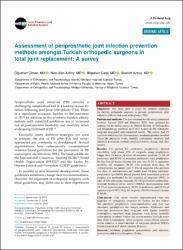| dc.contributor.author | Çimen, Oğuzhan | |
| dc.contributor.author | Azboy, Nesrullah | |
| dc.contributor.author | Çatal, Bilgehan | |
| dc.contributor.author | Azboy, İbrahim | |
| dc.date.accessioned | 2020-08-05T13:03:03Z | |
| dc.date.available | 2020-08-05T13:03:03Z | |
| dc.date.issued | 2020 | en_US |
| dc.identifier.citation | Çimen, O., Azboy, N., Çatal, B. ve Azboy, İ. (2020). Assessment of periprosthetic joint infection prevention methods amongst Turkish orthopedic surgeons in total joint replacement: A survey. Joint Diseases and Related Surgery, 31(2), 230-237. https://dx.doi.org/10.5606/ehc.2020.71425 | en_US |
| dc.identifier.issn | 2687-4784 | |
| dc.identifier.issn | 2687-4792 | |
| dc.identifier.uri | https://dx.doi.org/10.5606/ehc.2020.71425 | |
| dc.identifier.uri | https://hdl.handle.net/20.500.12511/5676 | |
| dc.description.abstract | Objectives: This study aims to assess the methods employed by Turkish orthopedic surgeons to prevent periprosthetic joint infection (PJI) in total joint arthroplasty (TJA). Patients and methods: The data obtained for this study, conducted between January 2019 and February 2019, were gathered by sending out an online survey to Turkish Society of Orthopedics and Traumatology members (n=2,267). A total of 354 orthopedic surgeons responded and completed survey. The survey had 23 questions which include the experience, academic position, hospital where the physician works, monthly arthroplasty numbers, and infection prevention methods employed before, during, and after surgery. Results: The period for antibiotics prophylaxis showed variability, with about 63% of surgeons using prophylaxis longer than 24 hours. In terms of academic position, 52.4% of professors and 52.8% of associate professors used prophylaxis for the first 24 hours whereas this rate was 31.3% in operators (p=0.01). Of surgeons, 50.7% who perform more than 10 arthroplasties per month and 33.6% of surgeons who perform less than 11 arthroplasties per month used 24 -hour antibiotic prophylaxis (p=0.006). Blood glucose level assessment prior to surgery was performed by the majority of surgeons (94%). A total of 118 orthopedic surgeons (33.3%) performed methicillin- resistant Staphylococcus aureus (MRSA) decolonization with 54.7% of associate professors, 59.5% of professors, and 24.7% of operators (p=0.001). Only 60 surgeons (16.9%) checked vitamin D levels. Conclusion: Our study results demonstrated that the majority of orthopedic surgeons in Turkey do not follow the antibiotic prophylaxis recommendations and they use antibiotic prophylaxis for longer periods. Professors and associate professors, and surgeons with higher monthly arthroplasty numbers than surgeons with lower monthly arthroplasty numbers follow the recommended periods more than their counterparts. Most surgeons assess blood glucose levels whereas a small number of surgeons perform MRSA decolonization and check vitamin D levels. | en_US |
| dc.language.iso | eng | en_US |
| dc.publisher | Turkish Joint Diseases Foundation | en_US |
| dc.rights | info:eu-repo/semantics/openAccess | en_US |
| dc.subject | Antibiotic Prophylaxis | en_US |
| dc.subject | Periprosthetic Joint Infection | en_US |
| dc.subject | Prevention | en_US |
| dc.subject | Total Joint Arthroplasty | en_US |
| dc.subject | Turkey | en_US |
| dc.title | Assessment of periprosthetic joint infection prevention methods amongst Turkish orthopedic surgeons in total joint replacement: A survey | en_US |
| dc.type | article | en_US |
| dc.relation.ispartof | Joint Diseases and Related Surgery | en_US |
| dc.department | İstanbul Medipol Üniversitesi, Tıp Fakültesi, Cerrahi Tıp Bilimleri Bölümü, Ortopedi ve Travmatoloji Ana Bilim Dalı | en_US |
| dc.authorid | 0000-0001-5342-9861 | en_US |
| dc.authorid | 0000-0002-4883-4317 | en_US |
| dc.authorid | 0000-0003-0926-3029 | en_US |
| dc.identifier.volume | 31 | en_US |
| dc.identifier.issue | 2 | en_US |
| dc.identifier.startpage | 230 | en_US |
| dc.identifier.endpage | 237 | en_US |
| dc.relation.publicationcategory | Makale - Uluslararası Hakemli Dergi - Kurum Öğretim Elemanı | en_US |
| dc.identifier.doi | 10.5606/ehc.2020.71425 | en_US |
| dc.identifier.wosquality | Q3 | en_US |


















